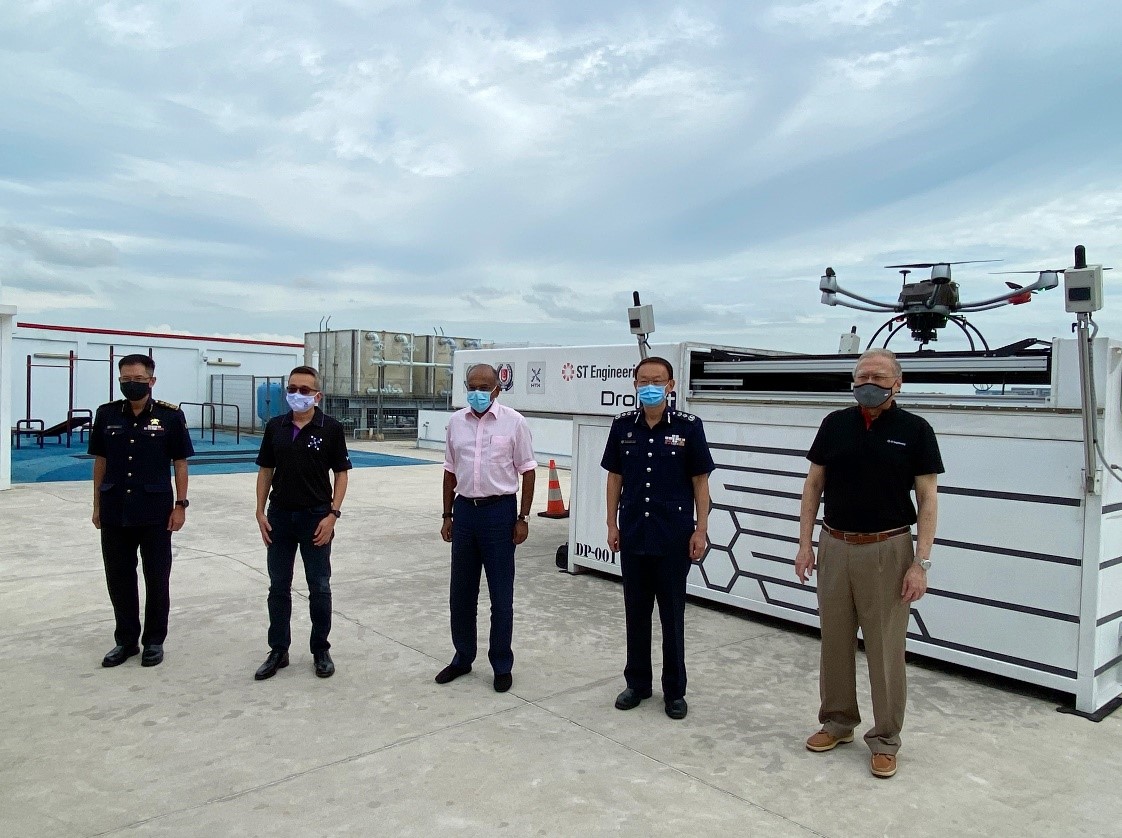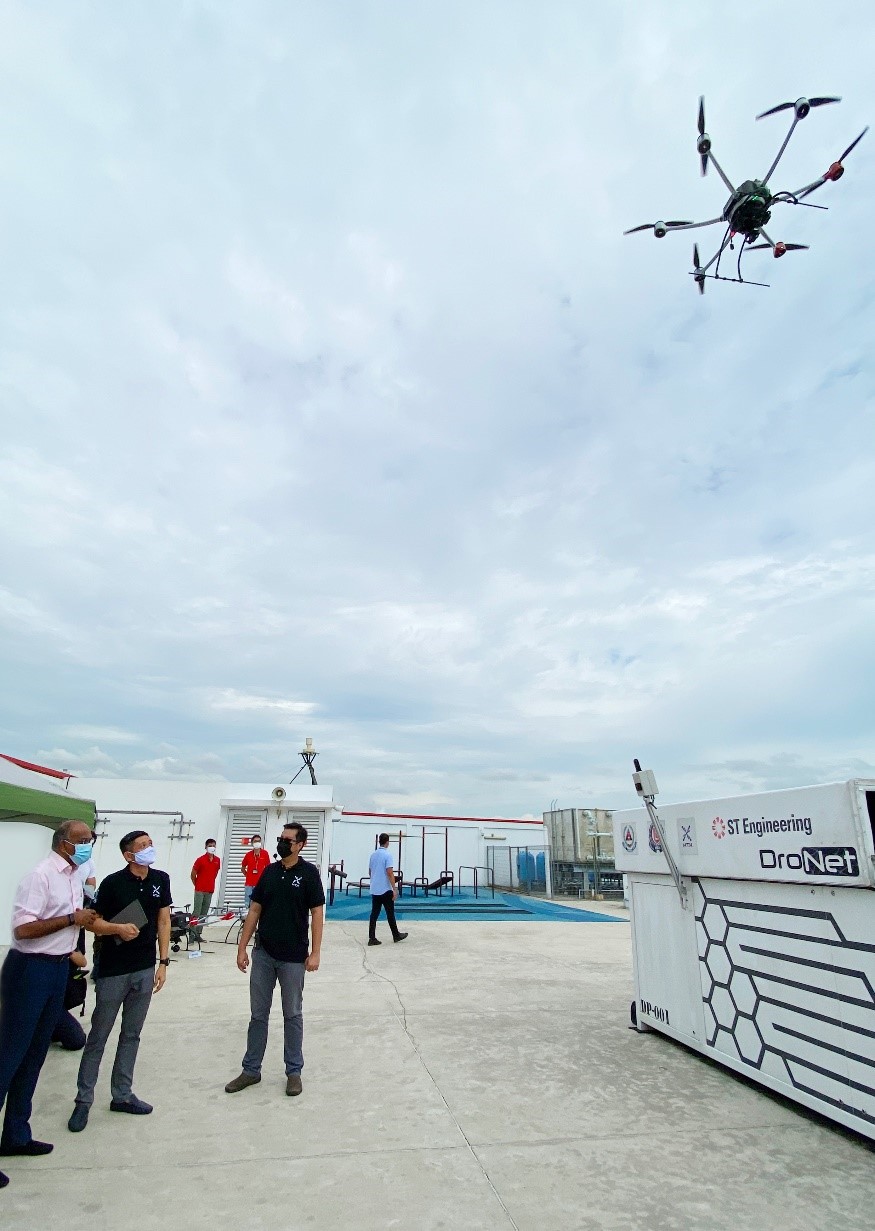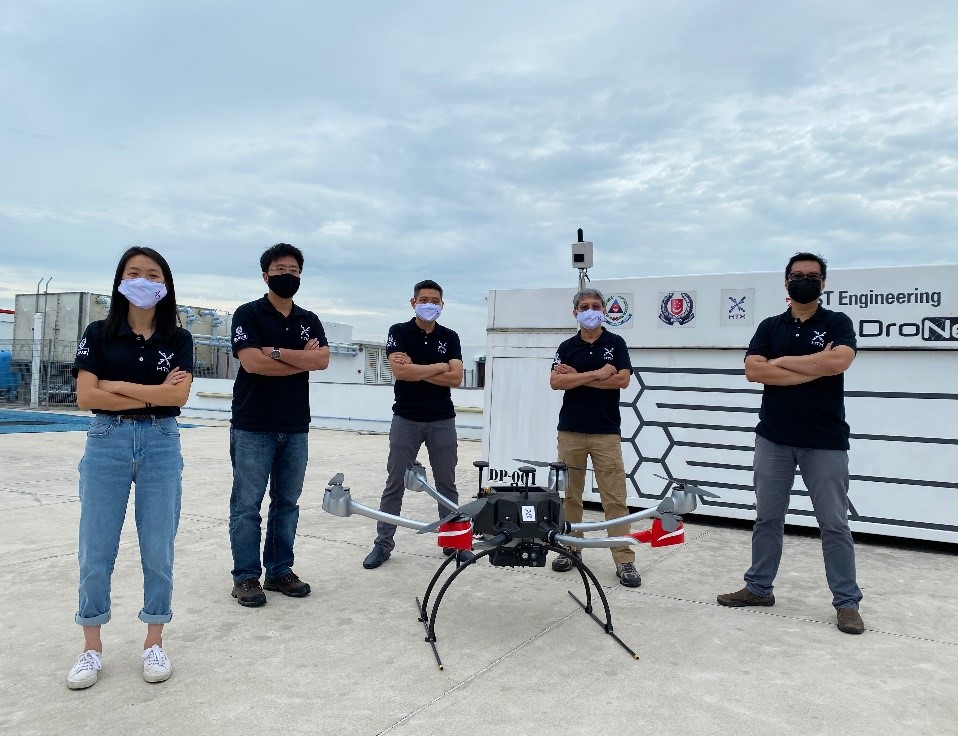With the successful implementation of HTX’s first long-distance Beyond Visual Line of Sight (BVLOS) flights for Unmanned Aerial Vehicles (UAVs), the Home Team is now able to further harness and apply this capability in areas such as saving lives and protecting properties, and enhancing public safety.
During the COVID-19 Circuit Breaker period, HTX augmented the Singapore Police Force’s resources on the ground by operating these BVLOS flights for patrolling operations around the industrial areas at Tuas South to ensure security. These autonomous flights enabled long distance and large area patrols, requiring only a very lean team to operate remotely.
Potential and Expanded Use of BVLOS UAV Flights
BVLOS UAVs are particularly useful to the Home Team for the conduct of patrols and security operations in areas which may be inaccessible or where situations are too risky for manual operations. BVLOS UAVs can also be used as a first responder to provide a situational picture of an incident site, such as a big-scale or high-security event with large crowds, and for sustained and routine patrols. As videos from the UAVs can be streamed to the Police Operations Command Centre, the Police can rapidly view and assess the situation before deciding on the appropriate resources to send to the ground.
Other situations where BVLOS UAVs can play a critical role include the detection of hazardous materials, the monitoring of fire scenes, and the delivery of essential supplies, which can include Automated External Defibrillators (AED) during critical missions like building collapses to help achieve a shorter response time for life-threatening cardiac arrest cases. The ability to commission BVLOS flights will increase the efficiency of Home Team operations and empower frontline officers to focus on higher-order tasks.
Mr K Shanmugam, Minister for Home Affairs and Minister for Law, viewed a BVLOS UAV flight demonstration at the Tuas View Fire Station today. He said: “This development is a key milestone in the Home Team’s use of cutting-edge technologies to transform the way we operate. HTX and the Home Team Departments must continue to innovate and find ways to harness technology to enhance the Home Team’s effectiveness in keeping Singapore safe and secure.”
.jpg?sfvrsn=da4213af_3) Minister K. Shanmugam (in pink shirt) listening to a presentation on the drone features and capabilities during his visit to Tuas View Fire Station on 16 September 2020 (Photo: HTX)
Minister K. Shanmugam (in pink shirt) listening to a presentation on the drone features and capabilities during his visit to Tuas View Fire Station on 16 September 2020 (Photo: HTX)
 Minister K. Shanmugam (in pink shirt) listening to a presentation on the drone features and capabilities during his visit to Tuas View Fire Station on 16 September 2020 (Photo: HTX)
Minister K. Shanmugam (in pink shirt) listening to a presentation on the drone features and capabilities during his visit to Tuas View Fire Station on 16 September 2020 (Photo: HTX)
 (Photo: HTX)
(Photo: HTX)
HTX is currently working with various Home Team departments to design and customise effective BVLOS UAV solutions to meet their specific needs and requirements.
Senior Assistant Commissioner of Police (SAC) How Kwang Hwee, Director of Operations Department, said, “The Singapore Police Force (SPF) continues to work with HTX and industry partners to embrace new technologies to enhance our operational capabilities. The development of BVLOS drones is the next phase in SPF’s UAV operations. Recently, BVLOS drones have been successfully deployed to complement officers on the ground in various operations.”
Innovative Tech Enabling BVLOS UAV Flights
HTX’s Robotics, Automation & Unmanned Systems (RAUS) Centre of Expertise (CoE) worked with ST Engineering Aerospace to develop the Vertical Take-Off and Landing (VTOL) hexacopter drone that was used to conduct the BVLOS flight.
Autonomously launch and recover
The hexacopter drone uses a Drone Box concept, which allows it to autonomously launch and recover. “The Drone Box has a robotic automation system which can rapidly change out the depleted battery of the hexacopter drone and prepare it for its next mission”, said Director of HTX’s RAUS CoE, Cheng Wee Kiang, “Within the Drone Box, there is also a batch of drone batteries that are being charged and ready to be installed. This feature allows for a quick turnaround during operations without the need for manual intervention.”
Autonomously swap payloads
The automated payload swap feature of the Drone Box outfits the drone with the most effective payload for each specific operation. Such payload could comprise cameras, HazMat detectors or mechanisms for the delivery of items such as AEDs. “The automated payload swap means that the payloads can be adapted to different missions and situations swiftly. Since the mundane and time-consuming tasks are taken care of by automation, it will tremendously improve the agility and efficiency of the Home Team’s operations”, Mr Cheng added.
Fly longer distances in a shorter time
The operating concept of the Drone Box also enables the hexacopter drone to fly longer distances over sub-urban areas. According to Mr Cheng, the VTOL hexacopter drone can achieve a flight distance of a few kilometres in about 30 minutes, and also cover more areas within a shorter time.
 The HTX RAUS team involved in the development of this advanced drone capability: (from left) Vanessia Choo, Low Hsien Ming, Cheng Wee Kiang, Chua Song Heng, Looi Xinglun (Photo: HTX)
The HTX RAUS team involved in the development of this advanced drone capability: (from left) Vanessia Choo, Low Hsien Ming, Cheng Wee Kiang, Chua Song Heng, Looi Xinglun (Photo: HTX)

